What is Biblical Neuroplasticity? (And How It Impacts Visibility & Confidence in Your Business)
Struggling with negative self-talk? Understand how biblical neuroplasticity (aka God’s design for renewing your mind) empowers you to break free from self-doubt and transform how you see yourself in business (and life!).
Heads up! This post may contain affiliate links, which means I get a small commission if you make a purchase — at no extra cost to you. I only recommend products I love and trust! Read my full disclosure here.
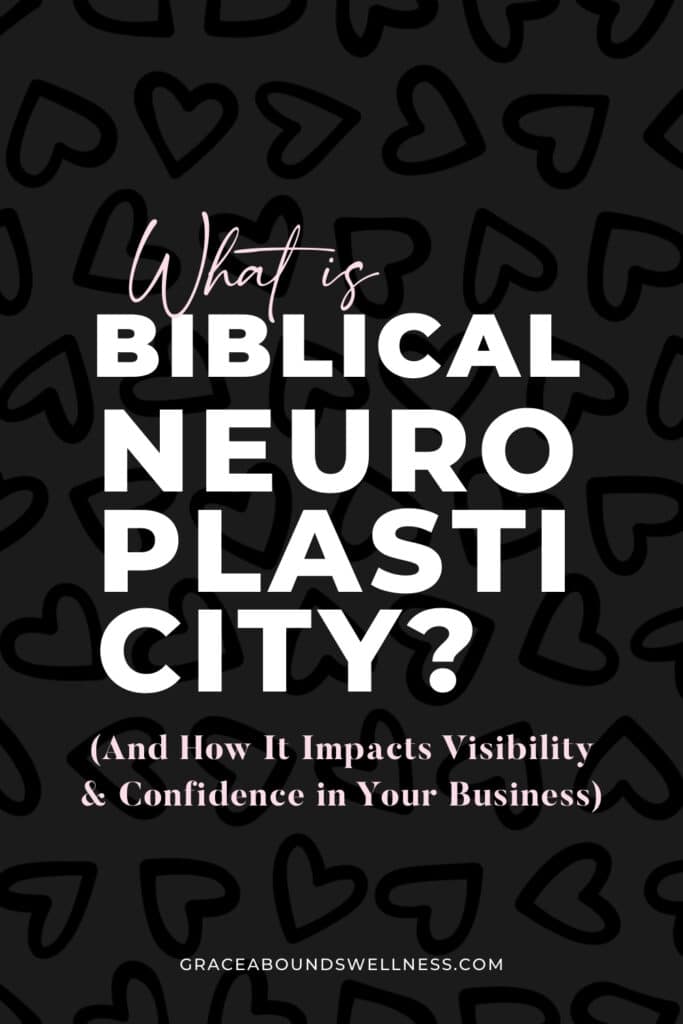
Part ONE of THREE.
The first time I heard about neuroplasticity, I was like, neuro… who? So I started researching…
And here’s what happened…
The science geek in me was fascinated by the details — but the broken girl in me was magnetically drawn to something even more powerful…
HOPE.
Hope that I could heal my mind from the early childhood lies, diet culture, and insecurities that had shaped me for years.
And my beautiful friend, there’s hope for you too.
Let me start with a little confession, friend…
The first time I heard the word neuroplasticity, it sounded way too science-y for me. But then my sister-in-law, Alexandra, shared a video of Alisa Keeton — founder of Revelation Wellness — and something clicked.
I felt like I’d stumbled onto holy ground.
Because in her words, science finally caught up to what Scripture has always said…
Your brain isn’t fixed — it’s designed by God to change and grow.
And if you’re anything like me — a Christian solopreneur trying to navigate business while secretly struggling with self-doubt, insecurity, or body-image battles — this is the truth your heart and business desperately need (the kind of truth that can change everything!).
So, grab your favorite drink (you know mine’s hot chocolate!), and let’s unpack what neuroplasticity is, why it matters, and how God designed your brain to help you thrive.
(And if you stick around till the end, you can grab a free neuroplasticity PDF summary — so you can start practicing right away!)
Let’s dive in!
So… What is Neuroplasticity (in Plain English)?
The neuroplasticity definition that the National Library of Medicine offers is:
Neuroplasticity, also known as neural plasticity or brain plasticity, is a process that involves adaptive structural and functional changes to the brain. Or the ability of the nervous system to change its activity in response to intrinsic or extrinsic stimuli by reorganizing its structure, functions, or connections.
Neuroplasticity in simple words…
Simply put, neuroplasticity is your brain’s incredible, God-given ability to change and rewire itself based on…
- what you think
- what you say
- what you do
Imagine your brain like clay in a potter’s hands — every thought you think, every word you say, and every action you take shapes it.
In other words…
- When you think new thoughts, you build new neural pathways (aka change the way your brain thinks about things).
- When you speak God’s truth (out loud), your brain listens and aligns with that truth.
- When you experience new things, your brain grows stronger connections.
Bottom line?
You aren’t stuck with your current struggles.
God designed your brain to adapt — so change isn’t just possible… It’s how you were designed!
(Pretty incredible, right?)
And even more beautiful than brain science?
Grace.
Christ looks at you with compassion.
He sees your brokenness.
He sees how hard you try to fit in.
He sees your heart — and He understands why you do what you do.
His heart isn’t full of judgment. It’s full of empathy, love, and mercy.
There is no condemnation — Jesus already took care of that for you.
Now, you have access to the throne of grace.
Enter it boldly, friend — not with shame, but with confidence.
Because what’s waiting for you there isn’t judgment… it’s kindness, grace, and mercy with arms wide open.
Okay…
Now that you know what biblical neuroplasticity is, let’s look at why your heart (and your business) need this truth more than ever.
💖 You’ll Also Love 💖
- Part 2: How to Rewire Your Brain with Scripture (For Clearer Content & God-Led Confidence)
- Part 3: 5 Ways Renewing Your Mind in Business Transforms How You Show Up
- How to Renew Your Mind for Solopreneur Success: 11 Tips
- Lack of Confidence in Your Christian Entrepreneurship
Why Neuroplasticity Matters (Especially for You)
Your thoughts, words, and new experiences actually shape your brain.
Now, you might be wondering, “Wanda, that sounds great, but why should I care?”
Well, here’s why…
Your thoughts shape your business and life more than you realize…
- Keep thinking “I’m not good/expert enough,” and your brain strengthens pathways — reinforces that lie.
- If you constantly fear being visible online — your brain strengthens pathways of anxiety and fear.
But here’s the beautiful truth…
Through biblical neuroplasticity, you can literally retrain your brain.
You can replace self-doubt with confidence and insecurity with IDENTITY.
- It’s like a flexible muscle that can get stronger and smarter as you think, say, and do new things.
“Be transformed by the renewing of your mind.”
Romans 12:2
Neuroplasticity is the science behind Romans 12:2!
God calls you to renew your mind daily — and He designed your brain to help you do it.
It’s THE Biblical blueprint for limitless AND lasting transformation.
(Can you tell I’m excited?!)
In a nutshell — neuroplasticity matters because it allows your brain to adapt and grow, meaning you can change your negative thoughts about who you are (and so much more).
You see…
There’s hope my beautiful friend 💖
This next part is for nerds (like me!). If you wanna get right to the “how can I do this,” skip to the next section.
What are the 3 Types of Neuroplasticity?
1. Synaptic Plasticity (or Brain Cell Connections)
- This is like making stronger connections between brain cells when you learn new skills.
- Imagine it as new neural connections (pathways) in your brain becoming clearer when you practice and remember things.
- Think of synapses as tiny bridges that help information travel between brain cells.
2. Structural Plasticity (or Brain Pathway Changes)
- This is the ability of the brain structure to physically change its shape.
- It’s like your brain building new roads (neural connections) or even new houses (new brain cells) to help you understand, learn, and remember information better.
3. Functional Plasticity (or Brain Function)
- If one part of your brain isn’t working at full strength, other parts can step in and help.
- It’s like when you’re wearing all the hats in your business — and one thing (like writing content) just isn’t clicking. So you pivot. You shift focus, get creative, or use a tool to keep things moving.
Your brain does the same.
It finds a workaround to keep you going — even when one “department” is offline. That’s the beauty of God’s design: resilience built right in!
And can we just pause here for a second?
This isn’t just science — this is Scripture come to life.
God has always called you to think differently.
Look what His Word says…
We demolish arguments and every pretension that sets itself up against the knowledge of God, and we take captive every thought to make it obedient to Christ.
2 Corinthians 10:5
You will keep in perfect peace those whose minds are steadfast because they trust in you.
Isaiah 26:3
Set your minds on things above, not on earthly things.
Colossians 3:2
Create in me a pure heart, O God, and renew a steadfast spirit within me.
Psalm 51:10
3 Everyday Examples of Neuroplasticity (You’ve Probably Already Experienced!)
Still sound too abstract?
Here are some super practical examples…
1. Learning Something New
Remember trying a new skill like Canva design or Pinterest strategy? Your brain literally built new pathways, making it easier each time.
2. Building a Habit
Remember how awkward filming your first video felt? But now? Your brain adapted — and what felt uncomfortable now feels second-nature.
3. Overcoming a Fear
Like finally publishing that first vulnerable blog post or sending that email broadcast — even though you were terrified? Your brain rewired, learning: “This isn’t so scary.”
Your brain is already changing every day — you just didn’t realize how powerful this could be when you intentionally apply it to your mindset, messaging, and business!
💖 Super Helpful Resources 💖
1. Body Revelation by Alisa Keeton
2. Neuroplasticity: Healing the Brain from Psychological Disorders Through Biblical Meditation
3. The Body Keeps the Score: Brain, Mind, and Body in the Healing of Trauma
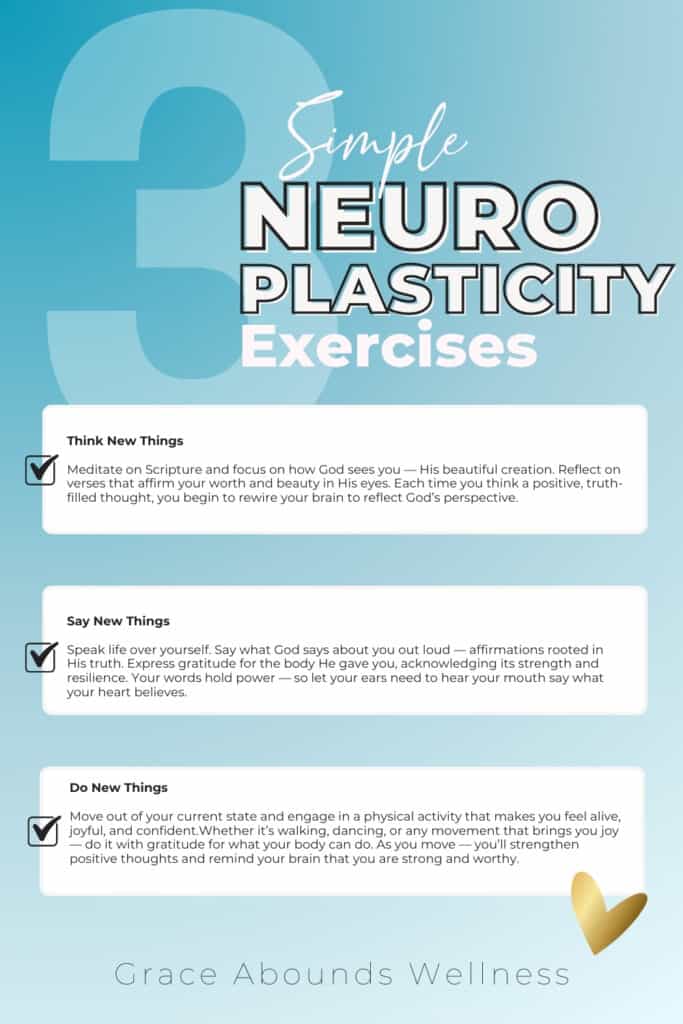
Next Steps…
Now that you’ve got a clear understanding of neuroplasticity, you might be asking:
“Okay, Wanda — this is fascinating, but how do I actually use neuroplasticity to overcome self-doubt, body image struggles, or that fear of putting myself out there in business?”
Great question — so great that I’m dedicating an entire blog post to exactly that!
👉 In Part 2: “How to Rewire Your Brain (3 Grace-Based Steps to Overcome Self-Doubt and Clarify Your Message)” (coming next week!)
I’ll show you exactly how to put this powerful tool into action — practically and Biblically.
But before you go — don’t leave empty-handed…
🎁 Grab Your Free Neuroplasticity Summary PDF — an easy reference guide to remember today’s powerful truths.
(And seriously — if this stirred something in your heart, drop me a comment. I’d love to hear what you think!)
By practicing biblical neuroplasticity, you have the power to change how you see yourself. Let go of insecurity and step into the freedom of knowing you are beautifully made. With Christ, you’ve got this! 💝
Watch it on YouTube 👇🏼
🤗 Sharing is caring!
If this post spoke to your heart, would you share it with a solopreneur friend who might also be feeling stuck or second-guessing herself?
Text her the link. (Seriously — don’t overthink it.)
Because sharing the hope is what it’s all about.
And hey — I’d love to hear from you!
Drop a comment below and let me know if this helped or what you’d love to see me unpack next. I’m all ears, friend.
“I am one in whom Christ dwells and delights. I live in the strong and unshakable kingdom of God. The kingdom is not in trouble and neither am I.”
— James Bryan Smith —

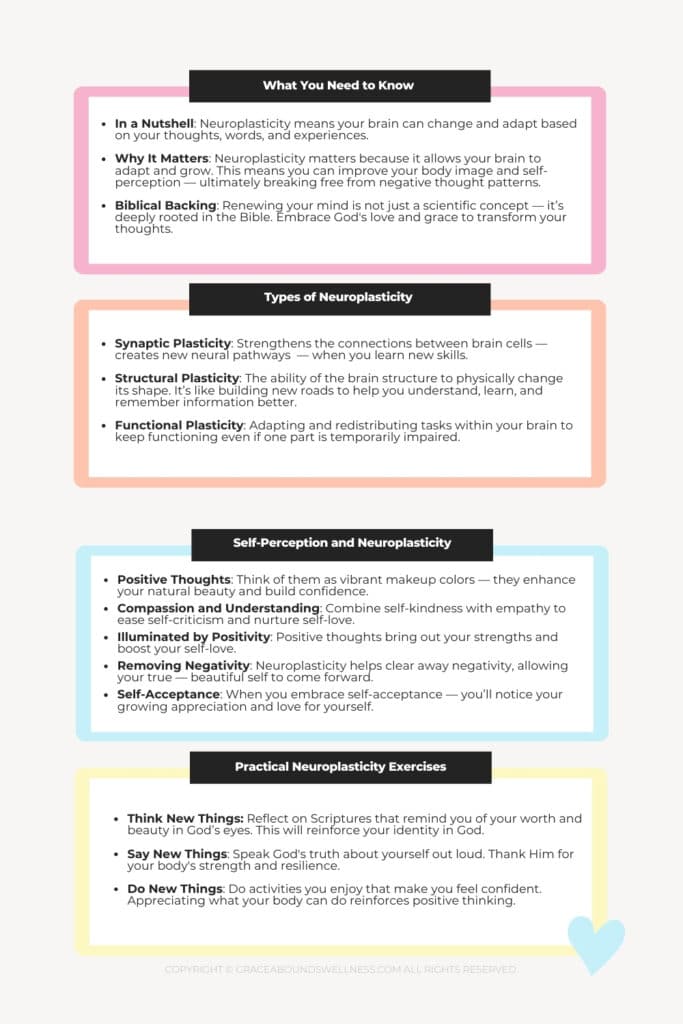



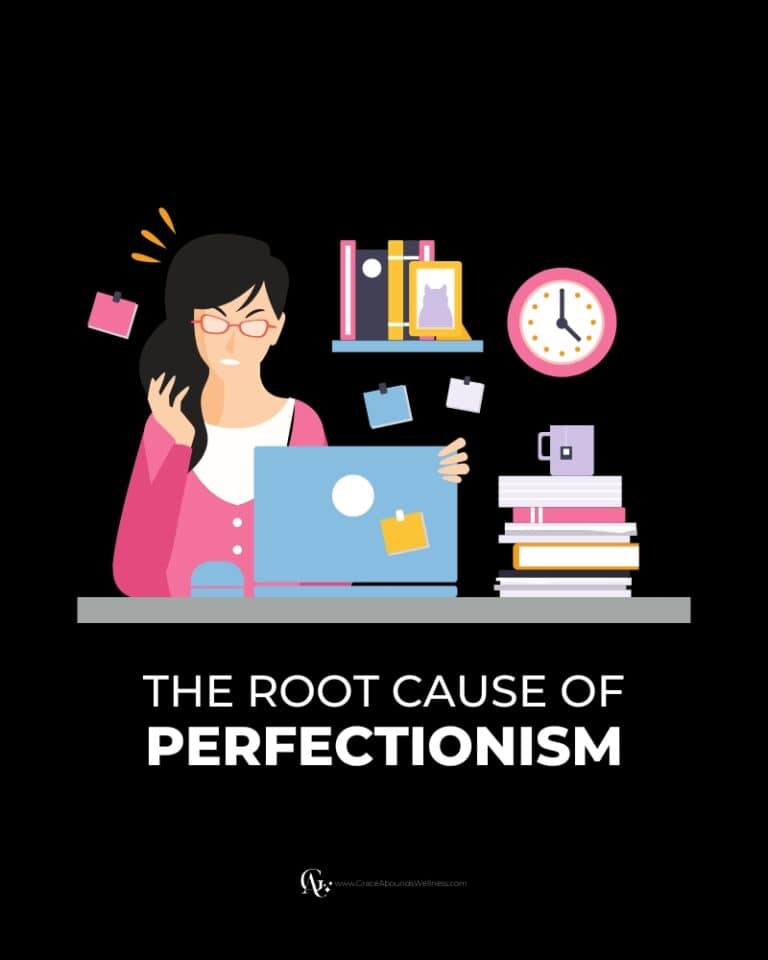
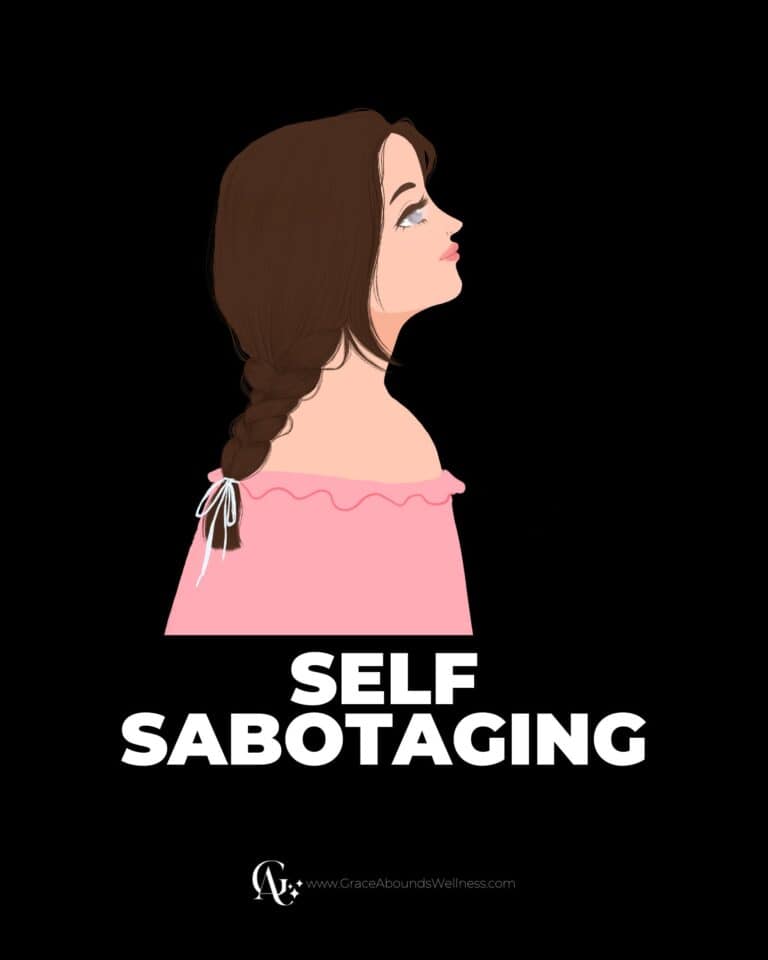
Hey Krissy! Neuroplasticity is fascinating! I see it as God, being the Sovereign God He is, designing our brain to recover from the lies and trauma He knew we’d experience. Another act of grace… So glad to have you here! God bless you 🤗💖
Thank you so much for this!! I have been praying about learning more about Neuroplasticity , but I definitely wanted to make sure my mind was being renewed and changed by God…. I am Definitely saving this and sharing with other others. Again, thank you for sharing this and praying blessings over you and your life. Praying that the Lord will continue to give you wisdom and do his will 😊🙏🏻🙌